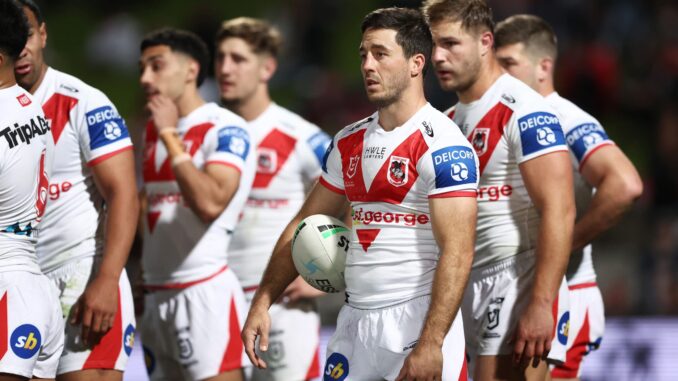
In the fast-paced world of professional rugby league, player movements and club negotiations often capture the attention of fans and analysts alike. Recently, the saga surrounding Ben Hunt, the St. George Illawarra Dragons’ veteran halfback, has taken another intriguing turn as another club has officially withdrawn from the race to secure his services. This development is significant not only for Hunt but also for the broader landscape of the NRL.
Hunt, a player renowned for his agility, game management, and experience, has been a pivotal figure for the Dragons. His leadership on the field and ability to influence matches has made him a sought-after commodity, especially as clubs look to bolster their rosters ahead of the upcoming season. Speculation surrounding his future has intensified over the past few months, with several teams expressing interest in acquiring his talents.
The latest club to step back from the hunt (no pun intended) has raised eyebrows, particularly given the player’s pedigree. Rumors had circulated that this club was keen on securing a seasoned playmaker to provide guidance to younger talents and to strengthen their overall competitive edge. However, a combination of financial constraints and strategic reassessments led them to reassess their position. This decision reflects the reality many NRL clubs face: the balance between investing in star players and maintaining financial health.
For Hunt, this development could signal a shift in his prospects. As clubs weigh their options, the market dynamics are shifting, and he may find himself with fewer suitors than anticipated. While this could be viewed as a setback, it also opens doors for more focused negotiations with interested parties. The Dragons have been clear about their intentions, expressing a desire to retain Hunt for the upcoming season, and this latest news might strengthen their hand in negotiations.
Moreover, the implications of this decision extend beyond Hunt. The NRL landscape is ever-evolving, and clubs are increasingly looking to build teams that can compete effectively in the long term. As some clubs back away from high-profile targets like Hunt, others might see an opportunity to capitalize on a player of his caliber. The competition for quality halves is fierce, and Hunt’s experience could be a valuable asset for a club looking to make a serious playoff push.
On a broader scale, this scenario highlights the complex nature of player recruitment in the NRL. Clubs must navigate various factors, including salary cap restrictions, team chemistry, and long-term strategic goals. The decision by one club to withdraw from the race underscores the need for clear planning and foresight in roster management. It also serves as a reminder of the unpredictable nature of sports, where player availability and club priorities can change rapidly.
As the dust settles on this latest development, all eyes will remain on Ben Hunt. His next steps could define not only his career but also impact the teams that seek his signature. While one club may have exited the race, the future remains uncertain, and in the world of rugby league, anything can happen. For fans and pundits alike, the narrative surrounding Hunt will undoubtedly continue to evolve as the season approaches, keeping the excitement alive in the ever-dynamic NRL landscape.
Be the first to comment